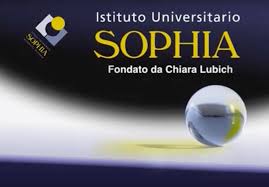
Mar 31, 2017 | Non categorizzato
 Ten years from its founding, Sophia University Institute expands from one course on Fundamentals and Prospectives of a Culture of Unity, to three distinct Master’s Degrees: Economic & Political Sciences, and Trinitarian Ontology & Culture of Unity. A programme that offers young people from around the world, an inter-discplinary and trans-disciplinary education focused on innovative sectors of social and civil economy, communion, participatory policies and their relationship to theology and philosophy. “With the addition of the new academic titles, Economic and Political Sciences and Trinitarian Ontology,” president of Sophia University Institute, Piero Coda, says that “Sophia offers students an academic degree which joins together the unitarian sense of the human adventure with a scientific degree that contributes to the total development of the individual and society.” Benedetto Gui, Coordinator of the Economy and Management Department, adds: “Among the novelties is the addition of the English language for several of the courses in the Economic and Political Sciences Degree programme.” He continues: “In an age when young people don’t have the courage to propose ideals to live by, Sophia seeks to found its vision of the world on a deep-rooted respect for the human person, including his or her culture, religion and views – and to look towards a world without hatred, war, oppression exlusion, or superiority over others. In the field of economics this doesn’t mean having a recipe ready to be imposed, but looking beyond today’s dominant reductive vision of economics and economic realtions, even though scientific reasearch is demonstrating the inadequacy of such a vision.” The students at Sophia come from 30 countries and belong to different religions. The Institute offers them a course of study that joins learning – through listening, discussing, reading, attending lectures – to real life. Applying the logic of openness to others as the very method for approaching learning which creates community life in the classroom, corriders and residences where students have an extraordinary intercultural experience. Gui continues: “What we strive to bring about together with the students is, on the one hand, the acquisition of those skills that one would expect to find in any graduate in the field of economics and, on the other hand, a deeper understanding of that economic vision which I mentioned before, through the examination of new lines of research and contact with economic projects that put that vision into practice . . . topics that are often neglected in university settings.” Once they’ve completed their studies, how do the students approach the work world? “Recruiters are well aware that knowledge of the subject is not enough to make a young person a valid member of an organisation. The ability to dialogue with the bearers of other types of knowledge is also necessary, knowing how to collaborate and to assume responsibilities. Our experience thus far has shown us that our students are appreciated not only for their academic preparation, but also for other skills that the experience at Sophia is particularly adept at developing in people. Be careful though: Education shouldn’t be be geared towards finding a job. It should also promote the growth of the human person and develop a capacity for personal and group intitiative which is also a precious contribution towards society.”
Ten years from its founding, Sophia University Institute expands from one course on Fundamentals and Prospectives of a Culture of Unity, to three distinct Master’s Degrees: Economic & Political Sciences, and Trinitarian Ontology & Culture of Unity. A programme that offers young people from around the world, an inter-discplinary and trans-disciplinary education focused on innovative sectors of social and civil economy, communion, participatory policies and their relationship to theology and philosophy. “With the addition of the new academic titles, Economic and Political Sciences and Trinitarian Ontology,” president of Sophia University Institute, Piero Coda, says that “Sophia offers students an academic degree which joins together the unitarian sense of the human adventure with a scientific degree that contributes to the total development of the individual and society.” Benedetto Gui, Coordinator of the Economy and Management Department, adds: “Among the novelties is the addition of the English language for several of the courses in the Economic and Political Sciences Degree programme.” He continues: “In an age when young people don’t have the courage to propose ideals to live by, Sophia seeks to found its vision of the world on a deep-rooted respect for the human person, including his or her culture, religion and views – and to look towards a world without hatred, war, oppression exlusion, or superiority over others. In the field of economics this doesn’t mean having a recipe ready to be imposed, but looking beyond today’s dominant reductive vision of economics and economic realtions, even though scientific reasearch is demonstrating the inadequacy of such a vision.” The students at Sophia come from 30 countries and belong to different religions. The Institute offers them a course of study that joins learning – through listening, discussing, reading, attending lectures – to real life. Applying the logic of openness to others as the very method for approaching learning which creates community life in the classroom, corriders and residences where students have an extraordinary intercultural experience. Gui continues: “What we strive to bring about together with the students is, on the one hand, the acquisition of those skills that one would expect to find in any graduate in the field of economics and, on the other hand, a deeper understanding of that economic vision which I mentioned before, through the examination of new lines of research and contact with economic projects that put that vision into practice . . . topics that are often neglected in university settings.” Once they’ve completed their studies, how do the students approach the work world? “Recruiters are well aware that knowledge of the subject is not enough to make a young person a valid member of an organisation. The ability to dialogue with the bearers of other types of knowledge is also necessary, knowing how to collaborate and to assume responsibilities. Our experience thus far has shown us that our students are appreciated not only for their academic preparation, but also for other skills that the experience at Sophia is particularly adept at developing in people. Be careful though: Education shouldn’t be be geared towards finding a job. It should also promote the growth of the human person and develop a capacity for personal and group intitiative which is also a precious contribution towards society.”
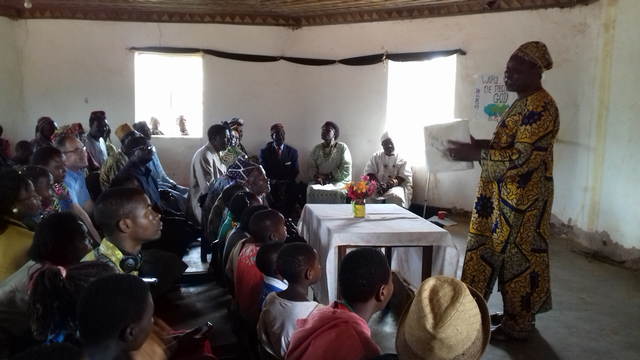
Mar 30, 2017 | Non categorizzato
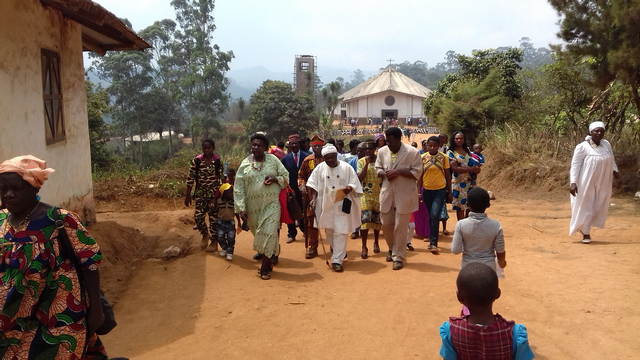 “We have renewed the pact and promise to continue living in the spirit of love, unity and peace which have changed our lives.” These were the words that the Chiefs of the Kingdom of Fonjumetaw wrote to Maria Voce, President of the Focolare Movement, when they gathered together with their communities last 5 March in said Kingdom, a village in the Cameroon forest. About 200 people participated in the event which took root in the history of these people. A strong bond unites the vast tropical region around Fonjumetaw to Fontem, where for the first time, in 1966, two focolarini doctors arrived to help the local population to overcome the diseases that were causing the high infant mortality rate. Fifty years ago, the Bangwa people were saved from the risk of extinction. Last September the Fons (traditional chiefs of the villages in the African region) went to Rome for the Jubilee of Mercy and to pay homage to Chiara Lubich (“Mafua Ndem,” Queen sent by God, as they named her), before her tomb at the International Focolare Centre in Rocca di Papa. The African delegation participated also in St. Peter’s Square in the meeting with Pope Francis and met the current President of the Focolare Movement, Maria Voce, and the Co-President, Jesús Morán.
“We have renewed the pact and promise to continue living in the spirit of love, unity and peace which have changed our lives.” These were the words that the Chiefs of the Kingdom of Fonjumetaw wrote to Maria Voce, President of the Focolare Movement, when they gathered together with their communities last 5 March in said Kingdom, a village in the Cameroon forest. About 200 people participated in the event which took root in the history of these people. A strong bond unites the vast tropical region around Fonjumetaw to Fontem, where for the first time, in 1966, two focolarini doctors arrived to help the local population to overcome the diseases that were causing the high infant mortality rate. Fifty years ago, the Bangwa people were saved from the risk of extinction. Last September the Fons (traditional chiefs of the villages in the African region) went to Rome for the Jubilee of Mercy and to pay homage to Chiara Lubich (“Mafua Ndem,” Queen sent by God, as they named her), before her tomb at the International Focolare Centre in Rocca di Papa. The African delegation participated also in St. Peter’s Square in the meeting with Pope Francis and met the current President of the Focolare Movement, Maria Voce, and the Co-President, Jesús Morán. 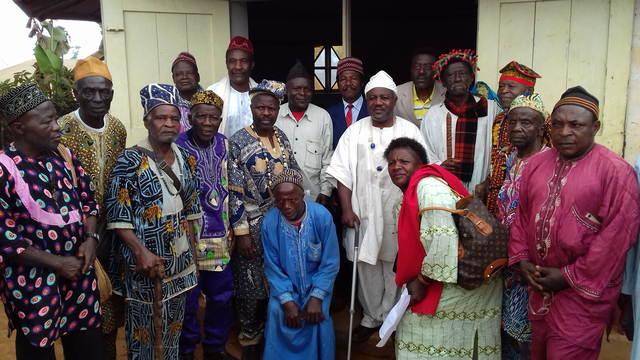 The Jubilee gave a new impulse to the New Evangelisation, strengthening the bonds of fraternity which these villages today are trying hard to live. The meeting of 5 March took on this meaning. The Fon recounted the “pilgrimage” to Rome with the other Fons of the zone, with Bishop Andrew Nkea Fuanya, and Bishop Emeritus, Francis Teke Lysinge. Upon inviting all to take a new step in the life of fraternity, he announced a “year of reconcilement.” Everyone agreed with joy. And in a celebrative atmosphere the youth, adults and children hugged one another to seal this commitment. One of the Chiefs presented the “dice of love”. Then he cast it in the air. The phrase that appeared was “love one another” and it was a confirmation also through a game, of the commitment each one wanted to undertake.
The Jubilee gave a new impulse to the New Evangelisation, strengthening the bonds of fraternity which these villages today are trying hard to live. The meeting of 5 March took on this meaning. The Fon recounted the “pilgrimage” to Rome with the other Fons of the zone, with Bishop Andrew Nkea Fuanya, and Bishop Emeritus, Francis Teke Lysinge. Upon inviting all to take a new step in the life of fraternity, he announced a “year of reconcilement.” Everyone agreed with joy. And in a celebrative atmosphere the youth, adults and children hugged one another to seal this commitment. One of the Chiefs presented the “dice of love”. Then he cast it in the air. The phrase that appeared was “love one another” and it was a confirmation also through a game, of the commitment each one wanted to undertake.  Then followed the experiences and staging of six points of the art of loving. One of the Chiefs recounted a strong experience: for many years he had not forgiven someone for an episode in which he had felt offended, but after hearing the invitation of the Pope to forgive and forget in the year of reconcilement, he was able to do so. At the conclusion, a festive moment ensued with the Fon and Mafua (Queen), and all the Chiefs, VIPS and focolarini. The Mafua talked about her encounters with Chiara in 2000 on the occasion of her visit to Cameroon, the “pilgrimage” of the delegation of 40 people to the Centre of the Focolare Movement in Rome, and the desire to spread the life of “Mother Chiara” amongst her people. The Chiefs’ letter to Emmaus, 17 years after Chiara’s last visit in these regions, sealed the commitment and the desire of all. These New Evangelisation meetings will continue. This is why the Fon of Fonjumetaw assigned one of the Chiefs to take charge of them. The next is set for 2 April.
Then followed the experiences and staging of six points of the art of loving. One of the Chiefs recounted a strong experience: for many years he had not forgiven someone for an episode in which he had felt offended, but after hearing the invitation of the Pope to forgive and forget in the year of reconcilement, he was able to do so. At the conclusion, a festive moment ensued with the Fon and Mafua (Queen), and all the Chiefs, VIPS and focolarini. The Mafua talked about her encounters with Chiara in 2000 on the occasion of her visit to Cameroon, the “pilgrimage” of the delegation of 40 people to the Centre of the Focolare Movement in Rome, and the desire to spread the life of “Mother Chiara” amongst her people. The Chiefs’ letter to Emmaus, 17 years after Chiara’s last visit in these regions, sealed the commitment and the desire of all. These New Evangelisation meetings will continue. This is why the Fon of Fonjumetaw assigned one of the Chiefs to take charge of them. The next is set for 2 April.
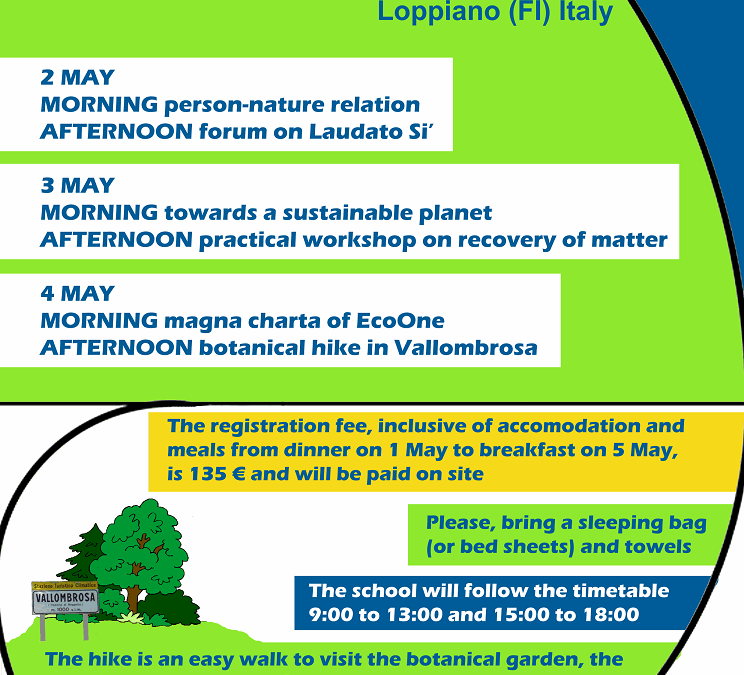
Mar 29, 2017 | Non categorizzato
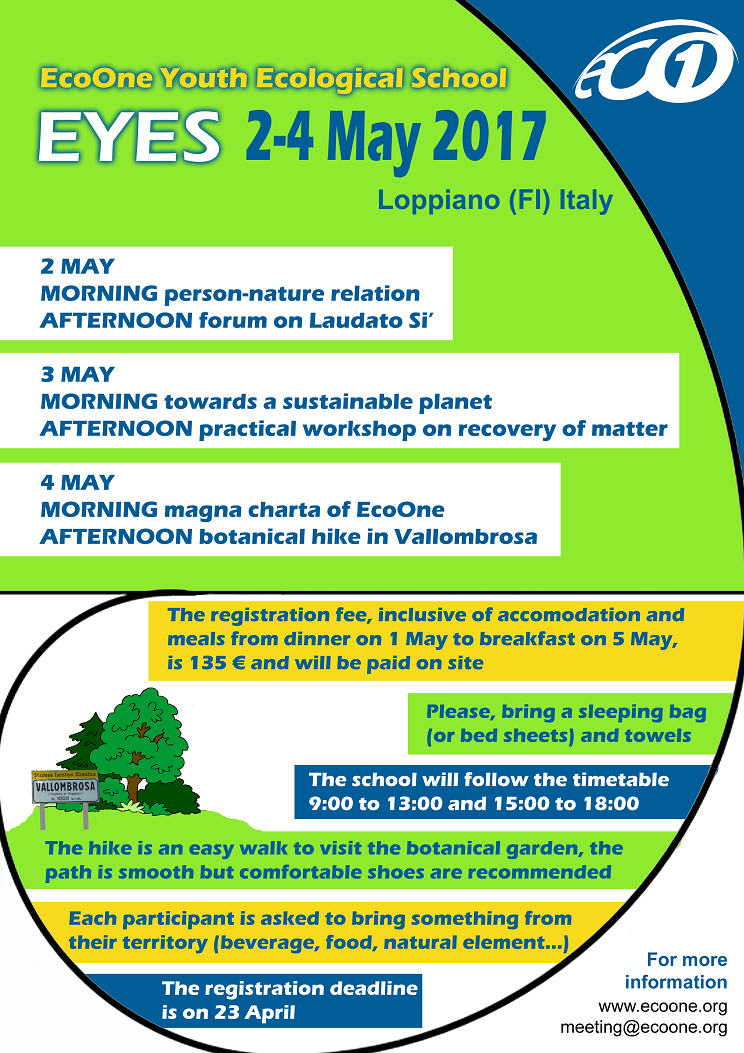 The Earth, our common home, is protesting. It seems to be turning more and more into a huge garbage dump. Its temperature is dramatically increasing and the depletion of natural resources makes it impossible to sustain the current level of consumption by the richest countries. Bio-diversity disappears and the quality of human life deteriorates. What is happening calls for an urgent need to undergo a bold cultural revolution. No one wants to regress to the neanderthal era, but it is essential to change direction and to work out a new model of development. The International EcoOne cultural initiative invites you to an ecological school to be held 2-4 May 2017 in Loppiano, Italy. It is aimed at young people, but open to all those who wish to look with new eyes at the relationship between human beings and nature. To subscribe please fill out the online form You can find more information in the attached flyer. The EcoOne Committee
The Earth, our common home, is protesting. It seems to be turning more and more into a huge garbage dump. Its temperature is dramatically increasing and the depletion of natural resources makes it impossible to sustain the current level of consumption by the richest countries. Bio-diversity disappears and the quality of human life deteriorates. What is happening calls for an urgent need to undergo a bold cultural revolution. No one wants to regress to the neanderthal era, but it is essential to change direction and to work out a new model of development. The International EcoOne cultural initiative invites you to an ecological school to be held 2-4 May 2017 in Loppiano, Italy. It is aimed at young people, but open to all those who wish to look with new eyes at the relationship between human beings and nature. To subscribe please fill out the online form You can find more information in the attached flyer. The EcoOne Committee
Mar 28, 2017 | Non categorizzato
The University Institute will be organising two open days at its international campus during which courses are presented in managerial skills in a changing world. Loppiano (Italy), 31 March and 30 April 2017
Mar 28, 2017 | Non categorizzato, Word of
https://www.focolare.org/gb/files/2017/03/201704Wol.mp3
Word of Life for ages 4-8 | for ages 9-14 | for ages 15-17 | MP3 Audio | Print
This was an invitation two travellers made to a stranger, having met him on their way from Jerusalem to the village of Emmaus. The stranger had come upon them while they were ‘talking and discussing’ all that had recently happened in that city, and he seemed to be the only person to know nothing about it. So the two of them welcomed him to walk with them, and they told him about ‘a prophet mighty in deed and word before God and all the people’ (Lk 24:19). They had put their trust in him, yet he had been handed over by the chief priests and the leaders of the people to the Romans, condemned to death and crucified. It was an immense tragedy, and they could make no sense of it. As they walked, the stranger helped them understand the meaning of what had happened, based upon Scripture. It rekindled hope in their hearts. When they reached Emmaus, they urged him to join them for supper: ‘Stay with us, because it is almost evening.’ While at table together, the stranger blessed the bread and shared it with them. This gesture opened their eyes to who he was: the man once crucified and dead was now risen! The two of them immediately changed their plans. They went back to Jerusalem to find the other disciples and tell them the great news. We too can be disillusioned, appalled, disheartened by a terrible feeling of powerlessness in the face of injustices done to the innocent and defenceless. Our own lives have their share of pain, uncertainty, darkness… How we would like to transform it all into peace, hope, light for ourselves and for others! Do we want to meet Someone who can understand us to the core of our being, Someone who can shed light upon our journey through life? Jesus, the God-man, freely accepted to experience the tunnel of pain as we do, to meet each of us in the depths of our situations. He felt physical pain, but he also felt inner pain: from betrayal by his friends to the point even of feeling forsaken by that very God he had always called Father (see Mt 27:46; Mk 15:34). Through his unshakeable faith in the love of God, he overcame such immense pain, entrusting himself once more to the Father (Lk 23:46), and from the Father he received new life. Jesus has brought all of us onto this same path, and he wants to travel with us. In the April 1999 Focolare Word of Life, Chiara Lubich wrote, ‘He is there in anything that hurts us … Let’s try to recognize Jesus in all the distress and the tough situations in life, in all darkness, in our personal misfortunes and those of others, and in the sufferings of the world around us. They are him because he has made them his own. It would be enough … to do something practical to lessen “his” suffering in the poor … for us to … find … a new fullness of life.’ A seven-year-old girl shared her experience: ‘I was very sad when my daddy was sent to prison. I loved Jesus in him, so when we went to visit, I didn’t cry in front of him.’ A young wife said: ‘I accompanied my husband, Robert, through the last months of his life, after the doctors gave him no hope of recovery. I never left him for a moment. Seeing him, I saw Jesus. Robert was on the cross, really on the cross.’ Their love for one another became a source of light for their friends, who were drawn to compete in solidarity, never letting up and spreading to many others, giving rise to an association for social development called Abbraccio Planetario (‘global embrace’). ‘What we experienced with Robert,’ said one of his friends, ‘inspired us to follow him on a real journey towards God. We often ask ourselves the meaning of suffering, illness and death. I believe everyone who had the gift of sharing a part of the journey alongside Robert now has a very clear answer.’ This month all Christians celebrate the mystery of Jesus’ death and resurrection. It is a chance to rekindle our faith in God’s love, which allows us to transform pain into love. Every detachment, separation, failure, and death itself, can become for us too, a source of light and peace. Sure of God’s closeness to each of us, in any situation, let’s repeat with trust the disciples’ prayer at Emmaus, ‘Stay with us, because it is almost evening.’ Letizia Magri
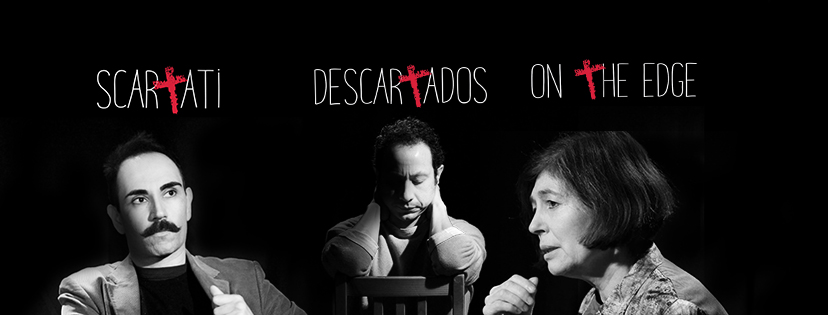
Mar 28, 2017 | Non categorizzato
 Discarded, outcast, crushed, seemingly with no escape: in their stories lie the inspiring sparks for this CSC Media production – a 20 minute video which recounts three true stories while maintaining anonymity. The protagonists who at the height of their pain come across a person – or rather the Person: Jesus. He too cried out in his abandonment on the cross, discarded by heaven and earth. They experience passing from death to life, from pain to love as expressed by some passages from Chiara Lubich which are included in the stories It is a project which was created thanks to a host of contributors. Featuring: Alessio De Caprio (Italy), Rafael Reyes Loyo (Mexico), and Sarah Finch (UK). Music by Sandro Crippa. Artwork by Roberto Cipollone (Bottega di Ciro, Italy). See trailer and more details at www.focolare.org/scartati. The video is available in three languages: Italian, Spanish and English.
Discarded, outcast, crushed, seemingly with no escape: in their stories lie the inspiring sparks for this CSC Media production – a 20 minute video which recounts three true stories while maintaining anonymity. The protagonists who at the height of their pain come across a person – or rather the Person: Jesus. He too cried out in his abandonment on the cross, discarded by heaven and earth. They experience passing from death to life, from pain to love as expressed by some passages from Chiara Lubich which are included in the stories It is a project which was created thanks to a host of contributors. Featuring: Alessio De Caprio (Italy), Rafael Reyes Loyo (Mexico), and Sarah Finch (UK). Music by Sandro Crippa. Artwork by Roberto Cipollone (Bottega di Ciro, Italy). See trailer and more details at www.focolare.org/scartati. The video is available in three languages: Italian, Spanish and English.

 Ten years from its founding, Sophia University Institute expands from one course on Fundamentals and Prospectives of a Culture of Unity, to three distinct Master’s Degrees: Economic & Political Sciences, and Trinitarian Ontology & Culture of Unity. A programme that offers young people from around the world, an inter-discplinary and trans-disciplinary education focused on innovative sectors of social and civil economy, communion, participatory policies and their relationship to theology and philosophy. “With the addition of the new academic titles, Economic and Political Sciences and Trinitarian Ontology,” president of Sophia University Institute, Piero Coda, says that “Sophia offers students an academic degree which joins together the unitarian sense of the human adventure with a scientific degree that contributes to the total development of the individual and society.” Benedetto Gui, Coordinator of the Economy and Management Department, adds: “Among the novelties is the addition of the English language for several of the courses in the Economic and Political Sciences Degree programme.” He continues: “In an age when young people don’t have the courage to propose ideals to live by, Sophia seeks to found its vision of the world on a deep-rooted respect for the human person, including his or her culture, religion and views – and to look towards a world without hatred, war, oppression exlusion, or superiority over others. In the field of economics this doesn’t mean having a recipe ready to be imposed, but looking beyond today’s dominant reductive vision of economics and economic realtions, even though scientific reasearch is demonstrating the inadequacy of such a vision.” The students at Sophia come from 30 countries and belong to different religions. The Institute offers them a course of study that joins learning – through listening, discussing, reading, attending lectures – to real life. Applying the logic of openness to others as the very method for approaching learning which creates community life in the classroom, corriders and residences where students have an extraordinary intercultural experience. Gui continues: “What we strive to bring about together with the students is, on the one hand, the acquisition of those skills that one would expect to find in any graduate in the field of economics and, on the other hand, a deeper understanding of that economic vision which I mentioned before, through the examination of new lines of research and contact with economic projects that put that vision into practice . . . topics that are often neglected in university settings.” Once they’ve completed their studies, how do the students approach the work world? “Recruiters are well aware that knowledge of the subject is not enough to make a young person a valid member of an organisation. The ability to dialogue with the bearers of other types of knowledge is also necessary, knowing how to collaborate and to assume responsibilities. Our experience thus far has shown us that our students are appreciated not only for their academic preparation, but also for other skills that the experience at Sophia is particularly adept at developing in people. Be careful though: Education shouldn’t be be geared towards finding a job. It should also promote the growth of the human person and develop a capacity for personal and group intitiative which is also a precious contribution towards society.”
Ten years from its founding, Sophia University Institute expands from one course on Fundamentals and Prospectives of a Culture of Unity, to three distinct Master’s Degrees: Economic & Political Sciences, and Trinitarian Ontology & Culture of Unity. A programme that offers young people from around the world, an inter-discplinary and trans-disciplinary education focused on innovative sectors of social and civil economy, communion, participatory policies and their relationship to theology and philosophy. “With the addition of the new academic titles, Economic and Political Sciences and Trinitarian Ontology,” president of Sophia University Institute, Piero Coda, says that “Sophia offers students an academic degree which joins together the unitarian sense of the human adventure with a scientific degree that contributes to the total development of the individual and society.” Benedetto Gui, Coordinator of the Economy and Management Department, adds: “Among the novelties is the addition of the English language for several of the courses in the Economic and Political Sciences Degree programme.” He continues: “In an age when young people don’t have the courage to propose ideals to live by, Sophia seeks to found its vision of the world on a deep-rooted respect for the human person, including his or her culture, religion and views – and to look towards a world without hatred, war, oppression exlusion, or superiority over others. In the field of economics this doesn’t mean having a recipe ready to be imposed, but looking beyond today’s dominant reductive vision of economics and economic realtions, even though scientific reasearch is demonstrating the inadequacy of such a vision.” The students at Sophia come from 30 countries and belong to different religions. The Institute offers them a course of study that joins learning – through listening, discussing, reading, attending lectures – to real life. Applying the logic of openness to others as the very method for approaching learning which creates community life in the classroom, corriders and residences where students have an extraordinary intercultural experience. Gui continues: “What we strive to bring about together with the students is, on the one hand, the acquisition of those skills that one would expect to find in any graduate in the field of economics and, on the other hand, a deeper understanding of that economic vision which I mentioned before, through the examination of new lines of research and contact with economic projects that put that vision into practice . . . topics that are often neglected in university settings.” Once they’ve completed their studies, how do the students approach the work world? “Recruiters are well aware that knowledge of the subject is not enough to make a young person a valid member of an organisation. The ability to dialogue with the bearers of other types of knowledge is also necessary, knowing how to collaborate and to assume responsibilities. Our experience thus far has shown us that our students are appreciated not only for their academic preparation, but also for other skills that the experience at Sophia is particularly adept at developing in people. Be careful though: Education shouldn’t be be geared towards finding a job. It should also promote the growth of the human person and develop a capacity for personal and group intitiative which is also a precious contribution towards society.”





